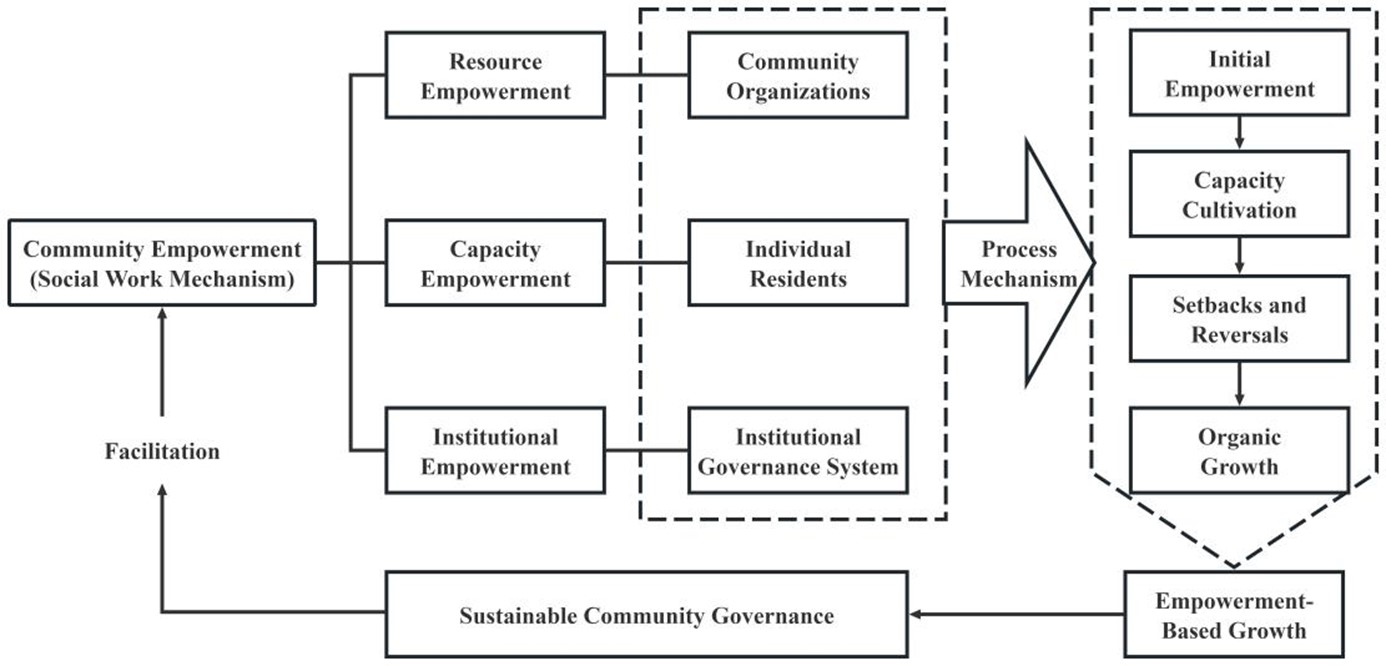Empowerment-Oriented Growth: Practical Pathways for Social Work Agencies in Community-Level Governance
Abstract
In the process of advancing Chinese modernization and improving the social governance system, grassroots governance is gradually shifting from a “management-oriented” to an “empowerment-oriented” approach. How to stimulate the endogenous motivation of grassroots actors through empowerment mechanisms has become a key issue in promoting the modernization of social governance. Taking Community H in Yinchuan, Ningxia as a typical case, this study adopts a “resources–capabilities–institutions” analytical framework to systematically examine the evolutionary logic and staged characteristics of community empowerment. The findings indicate that empowerment-oriented growth is not a linear process, but rather follows a curvilinear trajectory of “initial empowerment—capacity cultivation—recurring dilemmas—organic growth.” In the initial stage, the concentrated infusion of external resources effectively activated community vitality but also generated dependency risks. During the capacity cultivation stage, resident leaders gradually emerged, and public participation shifted from “passive” to “active.” In the recurring dilemmas stage, administrative absorption and institutional formalization undermined the effectiveness of empowerment, leading to fluctuations. Ultimately, in the stage of organic growth, the integration of resources, maturity of capacities, and institutional embedding interacted to foster sustainable community governance. The study further reveals that resource empowerment provides the conditions, capacity empowerment shapes the driving force, and institutional empowerment ensures the consolidation of outcomes. The dynamic tension and interaction among these three dimensions across different stages constitute the internal logic of empowerment-oriented growth. Therefore, advancing the sustainable development of community governance requires the organic integration of diversified resource coordination, progressive capacity cultivation, and endogenous institutional embedding.
References
[2] Luo, Q. Q. (2018). Performative participation and the deviation of community empowerment. Nanjing Social Sciences, (3), 112-118.
[3] Xia, J. Z. (2019). From community services to community building and community governance: The three stages of community development in China. Gansu Social Sciences, (6), 24-32.
[4] Li, L. Z. (2022). An analysis of institutional embeddedness of social organizations' participation in urban community governance-A cross-case study of social work agencies. Urban Development Studies, 29(6), 22-26.
[5] Min, J., & Yang, F. X. (2025). The empowerment logic of community governance in ethnic minority regions. Ethnic Studies, (1), 101-110.
[6] Rappaport, J. (1984). Terms of empowerment/exemplars of prevention: Toward a theory for community psychology. American Journal of Community Psychology, 15(2), 121-148. https://doi.org/10.1007/BF00919275
[7] Zhang, W. X., & Hou, Z. Y. (2024). The realistic dilemmas and path optimization of social organizations' participation in municipal social governance-A case study of Q City. Urban Development Studies, 31(3), 25-29.
[8] Wang, S. B. (2015). Networked service governance of social work agencies in social governance innovation. Xuehai, (3), 47-52.
[9] Dai, X. Z., Hou, G. F., & Yan, H. Y. (2020). The role of social work in promoting modernization of municipal social governance. Social Work, (3), 53-60.
[10] Li, Y. S. (2018). The logic of empowerment in grassroots governance. Ningxia Social Sciences, (6), 53-59.
[11] Wei, X. J. (2018). Research on innovative paths of social work in social governance. Studies on Socialism with Chinese Characteristics, (6), 81-85.
[12] Xu, X. G., & Xu, Y. X. (2016). "Dependency-driven growth" and the phenomenon of virtual empowerment. Jianghai Academic Journal, (5), 121-128.
[13] Zhang, L., & Liu, D. D. (2021). Social workers' participation in community consultation: Needs, advantages, and pathways. China Social Work, (7), 30-31.
[14] Chen, W. J. (2021). The logic of capacity cultivation in community governance. Northwest Population Journal, (2), 94-101.
[15] Hou, L. W. (2022). "Party-building" social work: Why is it possible and how can it be effective?-Also on the localization of social work. Hebei Academic Journal, 42(6), 9-15.
[16] Zhang, L., & Guo, S. L. (2019). Party-building socialization and localization of social work: Wenzhou's practice of party-led social governance. Journal of East China University of Science and Technology (Social Science Edition), 34(5), 9-18.
[17] Fu, Z. (2023). Practical strategies and action logics of social work participation in the construction of community governance communities-An analysis based on the "emotion-relationship-action" framework. Xinjiang Social Sciences, (3), 139-149, 152.
[18] Yan, Z. (2016). Professional social work intervention embedded in community governance-A case study of KC Community in Tianjin. Journal of East China University of Science and Technology (Social Science Edition), 31(1), 46-55, 61.
[19] Zheng, R. (2017). Collaborative governance in the "Three-Society Interaction": Forms, effectiveness, and value orientation. Zhejiang Academic Journal, (3), 72-76.
[20] Zhang, F., & Xu, P. Y. (2024). Theoretical foundations and practical paths of professional social work empowerment in petition governance. Social Construction, 11(5), 99-118.
[21] Li, P., & Wu, Y. (2021). An analytical framework of "resources-capabilities-institutions" interaction. Administrative Forum, (1), 73-80.
[22] Zhang, F. (2020). Residents' participation and community capacity building. Jianghan Academic Journal, (3), 98-105.
[23] Li, J. (2021). The endogenous logic of institutions and residents' participation. Community Development, (8), 88-95.
[24] Aikawa, M., Han, M., Nguyen, T. T., & Dinh, V. H. (2025). Improving field education for social work in Vietnam: Intern supervisors' perspectives of the current state and potential solutions. International Social Work, 68(1), 142-157. https://doi.org/10.1177/00208728241288016
[25] Cao, M., Xiang, T., Wu, T., Xu, X., & Zhang, Y. (2025). Application of health empowerment theory to enhance health empowerment levels and self-health management ability among migrant older adults: A randomized controlled trial. Geriatric Nursing, 65, 103525. https://doi.org/10.1016/j.gerinurse.2025.103525


This work is licensed under a Creative Commons Attribution 4.0 International License.
Copyright for this article is retained by the author(s), with first publication rights granted to the journal.
This is an open-access article distributed under the terms and conditions of the Creative Commons Attribution license (http://creativecommons.org/licenses/by/4.0/).









1.png)














